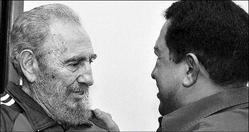
Cuba's Fidel Castro (left) greets Venezuelan President Hugo Chávez in Havana in this January 29, 2007 file photo. Venezuela is lending Cuba US$100 million to rehabilitate its railway system. - Reuters
Venezuela granted Cuba a US$100-million loan to improve its railways, Cuban media said on Tuesday, as the island nation moves to rebuild its dilapidated infrastructure after years of economic crisis.
Cuba's Communist Party newspaper Granma said Venezuela's Economic and Social Development Bank signed a credit agreement with Cuba's Banco Exterior to upgrade tracks, signals and communications.
"With this credit, the rails will be completely restored to their original condition to carry freight and passengers," Cuban Transportation Minister Jorge Luis Sierra was quoted as saying in Caracas.
Sierra said Cuba's recovering economy required better railways and that trains would be able to travel at 100 kilometres per hour (62 mph) from the current 40 kph.
Exports boost economy
Service exports to Venezuela and other countries, a guaranteed oil supply from the oil-rich South American ally, soft Chinese trade credits and high nickel prices have buoyed Cuba's import-dependent economy after a decade-long crisis that followed the demise of its benefactor, the Soviet Union.
After spending more than US$2 billion since 2005 to modernise its electrical grid and eliminate power blackouts, Cuba has set about overhauling its transport system, government officials say.
Few Cubans own cars, so they must wait hours for buses and trains, or else hitch-hike to get around. Many still use bicycles and horse-drawn carts.
The number of passengers moved by public transport in Cuba last year was just 21 per cent of the 1989 level, while cargo movement was one-third of the pre-crisis level, according to official statistics.
Signed contracts
Cuba recently signed contracts to purchase more than 6,000 buses and 100 locomotives from China, civilian passenger and cargo planes from Russia, 100 railway freight cars from Iran, and thousands of motors for antiquated Soviet-era trucks.
After low wages, the lack of public transportation is the biggest complaint levelled at the government by Cubans, followed closely by poor housing and high food prices.
The government announced earlier this month an increase in bus passengers in Havana for the first time since the early 1990s, and said people carried per day would double from 500,000 in 2006 to a million by the end of this year.
- Reuters

